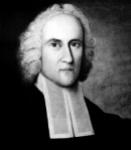Truth is… churches fire preachers. Some deserve it, some don’t. Truth is… preachers leave church too late, and before they should. Consider one pastor who was fired by the church he served… after 23 years… by a 230 to 23 vote (90% against him). I’ll explain why he was fired later…
 Jonathan Edwards was probably the greatest mind God ever produced in America. Most know him as the writer of “Sinners In The Hands Of An Angry God” which is stunning in it’s description of God’s wrath (Click here to download a free MP3 of the message. I encourage you to listen to this message. Reading it isn’t the same as hearing it read.).
Jonathan Edwards was probably the greatest mind God ever produced in America. Most know him as the writer of “Sinners In The Hands Of An Angry God” which is stunning in it’s description of God’s wrath (Click here to download a free MP3 of the message. I encourage you to listen to this message. Reading it isn’t the same as hearing it read.).
He is still widely read and quoted centuries after his death (How many of us will be able to say that?). In 1920 a study was done about his descendants which produced this amazing record…
In the year 1900, there were 1,394, of whom 1,295 were college graduates; 13 presidents of our greatest colleges; 65 professors in colleges, besides many principals of other important educational institutions; 60 physicians… 100 and more clergymen, missionaries, or theological professors; 75 were officers in the army and navy; 60 prominent authors and writers… 33 American States and several foreign countries have profited by the beneficent influences of their eminent activity; 100 and more were lawyers… 30 were judges; 80 held public office, of whom one was vice-president of the United States; 3 were United States senators; several were governors, members of Congress, framers of State constitutions, mayors of cities, and ministers to foreign courts… (Popenoe and Johnson, New York, 1920, pp. 161-62).
So what could bring a church to fire a man of the Biblical and intellectual strength of Jonathan Edwards? George Marsden wrote about the termination in his biography of Edwards…
The scene of America’s greatest theologian and colonial America’s most powerful thinker being run out of town and forced into exile in a frontier village has intrigued observers ever since. Is it the tragedy of the great man being crushed by following his own high principles? Or is it the pathos of a brilliant but impractical intellectual whose prudery and zeal for control brought out the latent pettiness of a small town? As in most of real life that rises beyond the ordinary, it was a mixture of both the exalted and the pathetic. (p. 369)
Edwards went on trial before a ministerial council which asked the congregation to vote their opinion. It was ten to one against: 230 men voted against him, and only 23 voted for him. The council’s investigation cleared Edwards of several charges against him, and affirmed that he was a fine pastor who could continue to serve in another congregation which shared his views of church membership.
But what was the issue that brought about such heated ire? It boils down to Jonathan Edwards believing that only Christians should partake in the Lord’s Supper. Imagine doctrine being the cause of firing a pastor! It is rare a pastor is terminated for doctrinal disagreement today.
Edwards’ farewell sermon was a sober reminder that this pastor and this congregation were standing in the presence of God, and would have another trial eventually:
With the intensity and unrelenting logic to which they were so accustomed, he depicted a compelling scene of how they would meet again before the great throne of God on the judgment day. At that meeting they would have to give an accounting of how they had treated each other as spiritual father and children, these twenty-three years. (Marsden, p. 361)

Very interesting! Many church members will give an account on day of how they have treated God’s called out ones.
I know how he feels. (Know) Pastor David Smith Churches are a lot like spiders, they consume their young. Peace my friend.
Thank you for your comment. The dynamics of church is a many layered dynamic that can’t be reduced to simple answers. Not everyone in the church (Or ministry) is a sheep or wheat. The call for the minister is to be faithful regardless of circumstances, events, or situations. Oh… and the minister should never play the martyr!
It is funny how evangelical churches want to minimise the difference between the pastor and the rest of the church in many areas…..except for the responsibility of the pastor to show a level of faithfulness and maturity beyond everyone else’s when it comes to serious conflict.
Even more interesting is that many evangelical churches cringe at the thought of church discipline of members BUT will “discipline” a pastor to the point of pressuring him to resign.